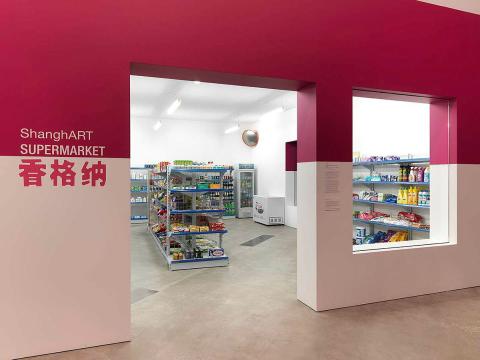Xu Zhen, ShanghART Supermarket (Australia), 2007–08
By Asian Art
ShanghART Supermarket (Australia) 2007–08 is one of Shanghai-based artist and curator Xu Zhen’s most recent installations. Emerging in the late 1990s as a radical and innovative artist in the fields of photography, installation and video art, Xu’s projects often incorporate elements of performance and draw their inspiration from the history of conceptual art. Often provocative and sensationalist, his work is thought-provoking, asking the viewer to question fixed assumptions.
This specially commissioned work is one of an edition of seven — one for each continent, although it is likely that the edition will become five, with the arctic regions unlikely to acquire them — and forms an incisive and humorous comment on notions of value and desire.
Xu Zhen's earliest projects were in close association with Shanghai contemporaries Yang Fudong and Yang Zhenzhong. In 1999, the three artists co-curated the exhibition ‘Art for Sale’ in which a supermarket-style area was set up in the exhibition space with inexpensive art works displayed on shelves. ‘Art for Sale’ was, in many ways, a precursor to Xu Zhen’s ShanghART Supermarket 2007. An earlier edition of ShanghART Supermarket was exhibited at the Art Basel Miami Beach art fair in 2007, and subsequently as part of a group exhibition at James Cohan Gallery in New York. For each edition, Xu Zhen meticulously reconstructs a modern Chinese supermarket complete with fluorescent lighting, refrigerators, cash registers, counters and staff, and stocks Lipton tea, cigarettes, sweets, Coca-Cola and bottles of beer on carefully organised shelves. The primary difference between this installation and an actual supermarket is that every container, packet or wrapper on display is empty. Despite their obvious emptiness, customers purchased these products by the bagful — empty packets of condoms and cigarettes proving particularly popular.
Xu Zhen’s installation at Art Basel Miami Beach formed a clever and complex statement about the art world, hinting at the inflated market prices and voracious demand for contemporary Chinese art. More broadly, the work comments on wider notions of value and authenticity, the assignation of economic status and consumer-driven desire. As one commentator writes:
'The project raises intriguing questions about the nature of representation, the ownership of image, and the process of production, distribution and audience reception. It addresses notions of authorship, authenticity, fiction and reality … While subtly alluding to China’s expanding powers, the store simultaneously reframes the codings of merchandise and artifacts — how objects are translated into cultural exempla, invested with value, and acknowledged by viewers and consumers.' (1)
Contemporary Chinese art is increasingly in the public eye, and China itself has come to dominate the international art market. Xu Zhen’s work is prescient, combining critical and unapologetic intelligence with knowledge of art-world aesthetics and a keen sense of irony.
Abigail Fitzgibbons, Artlines 1-2009, pp.36–37.
Endnote
1 Sine Bepler, ‘ShanghART Supermarket – Xu Zhen’.
